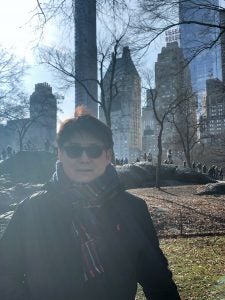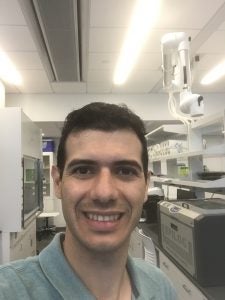Dr. Jongsun Kim
Postdoctoral researcher with Drs. David Ullman & Lew Rothstein, Graduate School of Oceanography, URI

HOWDY! I’m a coastal system modeler interested in physical and biogeochemical interactions in the coastal water ecosystem. I’m also a chemical oceanographer who works in marine and freshwater ecosystems. My work is centered around the interface of biogeochemical cycling in coastal ocean and ecosystem ecology. I ask questions relevant to understanding how natural and anthropogenic forces affect coastal biogeochemical cycling across different scales and how that influences ecosystem processes.
During graduate school at Texas A&M, my research directly targeted coastal issues. Much of my research area focuses on nutrient dynamics in the coastal system related to environmental problems such as hypoxia, dead zones, and primary production. Also, I work in salt marshes, mangroves, estuaries, and the continental shelf for the methane and submarine groundwater discharge (SGD) fluxes measurement.
As an RI C-AIM postdoctoral fellow, I am working to complete the final testing of the full 3D CoSiNE model implementation in Narragansett Bay. I am also assisting in an intermediate model parametrization performance for benthic ecology in which I’m running a 1D CoSiNE benthic-pelagic model to build the benthos module of the model.
Feel free to contact me (jongsun@uri.edu) if you wish to talk about anything related to my work. I look forward to working with the other members of the RI C-AIM community.
Amer Charbaji
Doctoral candidate, Dept. of Mechanical Engineering, URI

I work on developing paper-based microfluidic sensors for the detection of marine nutrients, mainly nitrate and phosphate. These nutrients are essential for plant growth but a lot of factors allow large amounts to find their way into water bodies. This usually creates situations of water nutrient pollution when the ecosystem gets oversaturated and can’t handle their excessive amounts. This causes serious environmental problems and poses tremendous health risks to humans and aquatic life. The paper-based microfluidic devices that I’m designing are inexpensive, do not require power input and are easy to use. They will allow improved monitoring of these nutrients and raise awareness by engaging the public.
I trust the American education system and the technical advancements achieved through rigorous research and hands-on learning experiences. That’s why I went to the American University of Beirut for my undergrad and the University of Maryland at College Park for my masters. My love for traveling and experiencing different cultures led me to work in Nigeria and Dubai for a few years. And even though I had a great time living and working in Dubai, I decided to come back to the United States to further my education.
I love traveling and I consider Haulien in Taiwan to be the most beautiful and peaceful place I’ve ever been to. I’ve been there twice already but would love to visit again and have more mochi. I also enjoy talking science, cooking, skiing, playing basketball/any sport, learning about everything, and many more things I still need to discover.

 RI NSF EPSCoR is supported in part by the U.S. National Science Foundation under EPSCoR Cooperative Agreements #OIA-2433276 and in part by the RI Commerce Corporation via the Science and Technology Advisory Committee [STAC]. Any opinions, findings, conclusions, or recommendations expressed in this material are those of the author(s) and do not necessarily reflect the views of the U.S. National Science Foundation, the RI Commerce Corporation, STAC, our partners or our collaborators.
RI NSF EPSCoR is supported in part by the U.S. National Science Foundation under EPSCoR Cooperative Agreements #OIA-2433276 and in part by the RI Commerce Corporation via the Science and Technology Advisory Committee [STAC]. Any opinions, findings, conclusions, or recommendations expressed in this material are those of the author(s) and do not necessarily reflect the views of the U.S. National Science Foundation, the RI Commerce Corporation, STAC, our partners or our collaborators.